The Roman elite were known for their political power and extravagant lifestyles, but they were also deeply involved in ritual magic and occult practices. Ritual Magic and Occult Practices Amongst the Roman Elite Uncovered explores this intriguing aspect of ancient Roman society that has often been a mystery.
In ancient Rome, these practices were important, reflecting a mix of superstition, power struggles, and spiritual beliefs. To understand the complexities of the Roman elite’s worldview and social structures, it’s crucial to grasp the historical context of their ritual magic.
Revealing the secretive nature of these rituals offers valuable insights into the motivations and aspirations of the Roman elite. It allows us to glimpse into a world where mysticism blended with everyday life, influencing decisions and actions in both fascinating and puzzling ways.
The Intersection of Religion, Magic, and Medicine in Ancient Rome
In ancient Rome, the intertwining of Roman religion with ritual magic and medicine created a complex tapestry of beliefs and practices among the elite. Public religious ceremonies, endorsed by the state, formed the backbone of societal cohesion and divine favor. In contrast, the private magical rituals performed by the Roman elite often existed in the shadows, blending superstition with practicality.
The Relationship between Public Religious Rites and Private Magical Practices
Public religious rites sanctioned by the state were essential for maintaining order and securing the favor of the gods. These ceremonies were grand affairs, involving elaborate sacrifices and processions, attended by both common citizens and influential leaders. The success of these rituals was believed to directly impact the well-being of the city and its inhabitants.
However, not all Romans were content to rely solely on state-sponsored religion. Among the elite, there existed a fascination with private magical practices that offered more personalized and immediate solutions to their problems. These rituals often involved invoking specific deities or spirits through secretive ceremonies known only to a select few.
The Intertwining of Ritual Magic and Medicinal Customs
Ritual magic played a crucial role not only in spiritual matters but also in medicinal practices. Elite Romans believed that certain incantations or talismans could influence health outcomes or protect against maladies. This fusion of magical incantations with medical treatments showcases how ancient Romans viewed magic as a versatile tool encompassing both mystical and practical aspects.
For instance, it was common for wealthy individuals to consult magicians or healers who combined traditional remedies with magical spells. This blending of techniques reflects an understanding that physical ailments could have both natural causes (such as imbalances in humors) as well as supernatural influences (such as curses or malevolent spirits).
The Dual Role of Magic: Fearful Superstition vs Practical Tool
Despite its practical applications, magic also carried an aura of fear and suspicion among the Roman elite. While some saw it as a means to manipulate their surroundings or gain an edge over rivals, others viewed it as a dangerous path fraught with moral peril.
This duality highlights how magic occupied a nuanced space in Roman society, where its efficacy was balanced against its potential consequences. On one hand, powerful figures may have employed occult practices for political advantage; on the other hand, such actions could invite backlash from both human adversaries and divine forces.
Ultimately, understanding this intersection between religion, magic, and medicine is crucial for comprehending the complexities of ancient Roman beliefs. It reveals how these seemingly disparate domains influenced one another—shaping not only individual lives but also broader societal dynamics.
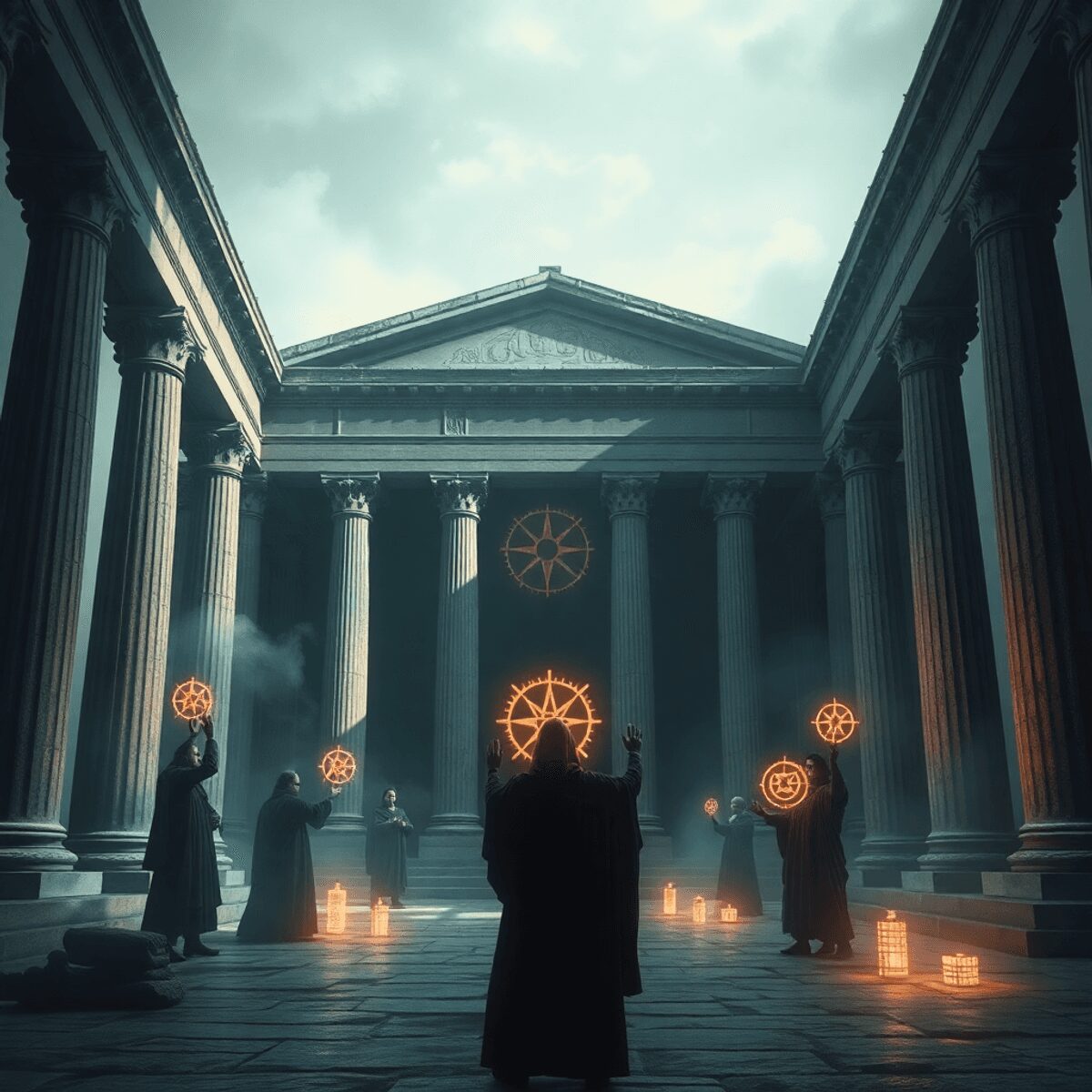
Types of Occult Practices Among the Roman Elite
The Roman elite engaged in various occult practices to gain power, influence, and control over their lives and the world around them. These practices included the use of charms, curses, divination methods, and the invocation of supernatural entities.
Charms and Curses: Manipulating Surroundings
One of the most common magical practices among the Roman elite was the use of charms and curses. Charms were believed to possess protective or beneficial qualities, while curses were intended to bring harm or misfortune to others. The elite would often employ these rituals as a means of manipulating their surroundings, whether it be for personal gain or to assert dominance over their rivals.
Divination: Predicting Outcomes in Favor of the Elite
Divination methods played a significant role in the decision-making processes of the Roman elite. Techniques such as astrology and augury were used to predict future events or gain insight into important matters. By interpreting celestial signs or observing the behavior of birds, the elite sought to influence outcomes that would benefit them politically, socially, or economically.
Invocation: Seeking Power from Supernatural Entities
The invocation of supernatural entities was another prominent aspect of occult practices among the Roman elite. Rituals were performed to call upon gods, spirits, or other powerful beings for various purposes. This could include seeking protection from enemies, acquiring knowledge or skills, or even exerting control over others through fear or manipulation.
These occult practices not only reflected the beliefs and values of the Roman elite but also served as tools for maintaining their status and authority in society.
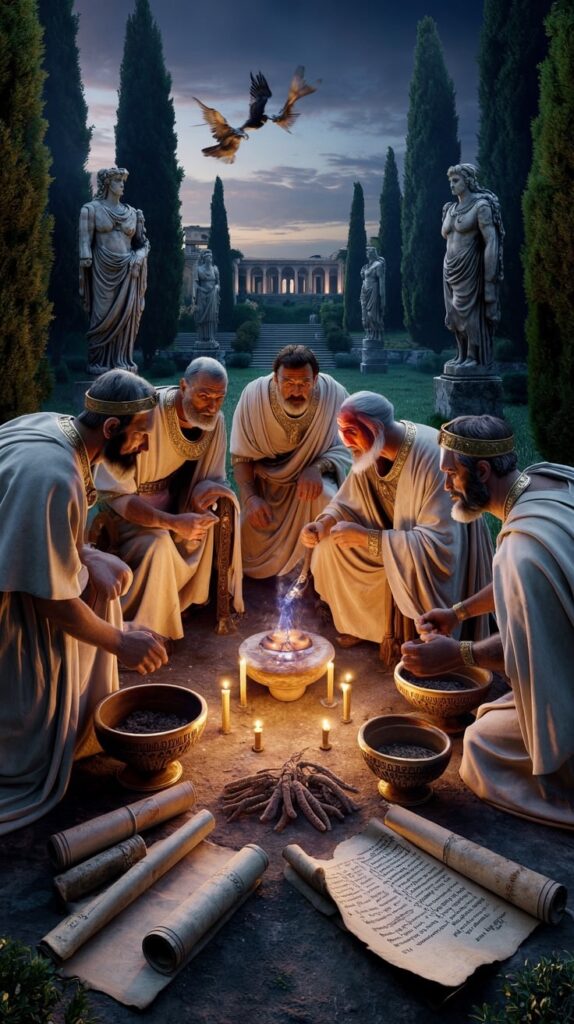
Secret Knowledge and Transmission of Occult Lore
Occult knowledge was carefully protected within elite groups, often requiring initiation into secretive cults or societies. This ensured that only a select few had access to the deeper mysteries and practices of magic.
The Role of Esoteric Texts
Esoteric texts, including grimoires and magical manuals, played a crucial role in preserving and transmitting ancient magical traditions among the Roman elite. These texts served as authoritative guides, outlining rituals, spells, and other occult practices that were passed down from one generation to another.
Influence of Greco-Roman Egyptian Magical Papyri
The influence of Greco-Roman Egyptian magical papyri on Roman elite practices cannot be overlooked. These ancient texts contained a wealth of knowledge about specific spells, invocations, and rituals that were often incorporated into Roman magical practices. The adoption of such practices demonstrates the syncretic nature of magic during this period, where different cultural influences blended together to create unique forms of occultism.
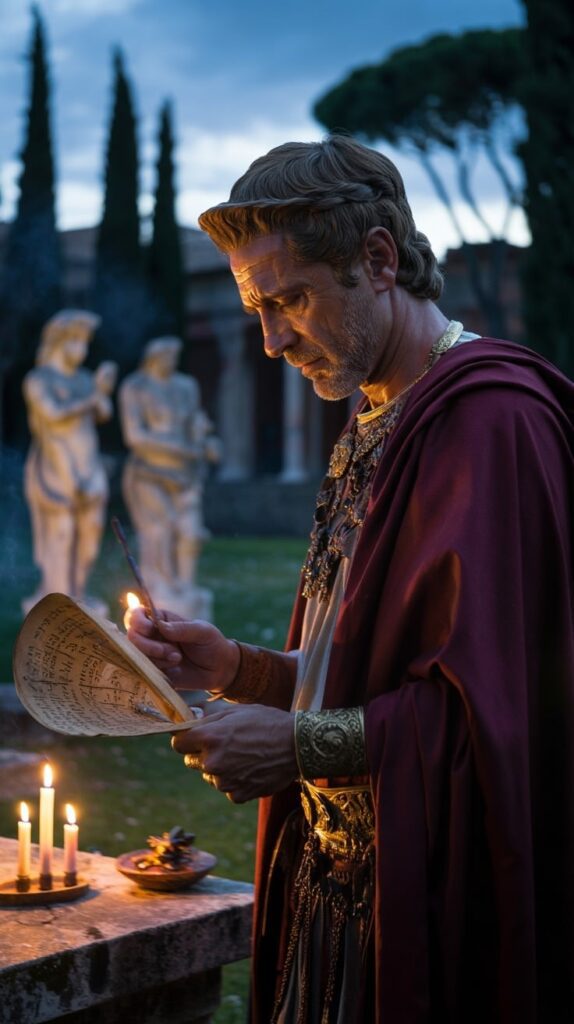
Use of Psychoactive Substances in Rituals
Psychoactive substances have played a significant role in various cultures throughout history, often being used in rituals to connect with the divine or access altered states of consciousness. The Roman elite were no exception, as they also turned to certain plants and substances for both medicinal and ritualistic purposes.
Psychoactive Plants Used by the Roman Elite
Several psychoactive plants were known to be utilized by the Roman elite, including:
- Opium: Derived from the poppy plant, opium has long been recognized for its sedative and pain-relieving properties. It is believed that some members of the Roman elite may have used opium not only for its medicinal benefits but also as a means to induce altered states during religious ceremonies.
- Mandrake Root: Mandrake root has been associated with various magical and medicinal practices throughout history. In ancient Rome, it was believed that consuming mandrake could bring about visions or enhance spiritual experiences, making it a potential candidate for use in rituals.
- Henbane Seeds: Henbane is another plant known for its psychoactive effects. The seeds of henbane contain compounds that can induce hallucinations and altered states of consciousness. It is possible that certain individuals within the Roman elite used henbane as part of their religious practices.
- Cannabis: While evidence regarding cannabis use among the Romans is limited, there are indications that it may have been present in some form. Cannabis has a long history of use as an entheogen (a substance used to induce spiritual experiences) in various cultures, so it is plausible that it could have found its way into Roman rituals as well.
Altered States of Consciousness and Spiritual Communication
The primary purpose behind using these psychoactive substances in rituals was often to achieve altered states of consciousness. Such states were believed to facilitate communication with divine beings or ancestral spirits—entities that held significant power and influence over people’s lives.
During ceremonies, participants may have consumed these substances intentionally or incorporated them into specific practices such as incense burning or offerings. By doing so, they sought to create an environment conducive for connecting with higher realms—where messages from gods or ancestors could be received.
It is important to note that while these beliefs existed among certain segments of society (such as the elite), not all Romans necessarily engaged in such practices. Additionally, our understanding of how exactly these substances were used remains somewhat speculative due to limited historical records.
Nonetheless, exploring the intersection between psychoactive plants and ancient Roman spirituality sheds light on their complex worldview—one where nature’s gifts played a role in shaping religious experiences.
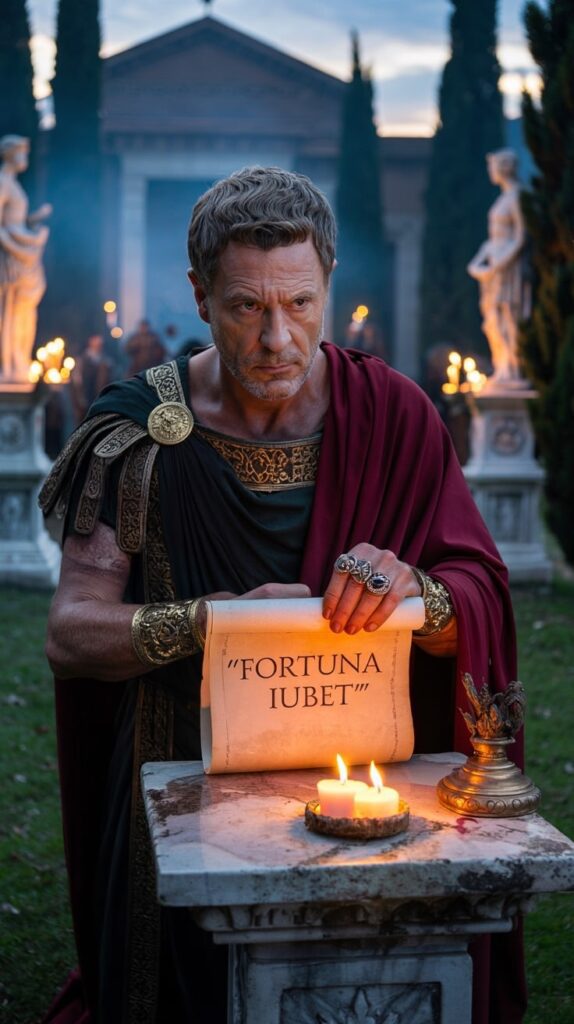
Mystery Cults and Spiritual Experiences Amongst The Elite
Mystery cults dedicated to deities like Dionysus and Orpheus played a significant role among the Roman elite, offering profound spiritual experiences through ritual intoxication. These cults were characterized by secretive ceremonies and practices that aimed to connect the participants with divine forces and deeper spiritual realms.
The Role Of Dionysian Cults Amongst The Roman Elite
Dionysian cults, known for their ecstatic rituals involving wine and music, provided a means for the elite to transcend their earthly existence and commune with the god of wine, fertility, and ecstasy. The use of ritual intoxication in these cults was believed to induce altered states of consciousness, leading to spiritual revelations and a sense of unity with the divine.
The Role Of Orphic Cults Amongst The Roman Elite
Similarly, cults devoted to Orpheus, the legendary musician and poet, focused on purifying the soul and achieving spiritual enlightenment through music, dance, and symbolic rites. Ritual intoxication in these cults was seen as a pathway to experiencing profound spiritual ecstasy and connecting with the mysteries of life and death.
The participation of the Roman elite in these mystery cults underscored their quest for transcendent experiences beyond the confines of everyday life, seeking spiritual fulfillment and a deeper understanding of the universe through mystical practices. This exploration into mystical practices reveals not just a search for personal enlightenment but also reflects broader cultural trends within Roman society during that era.
Political And Social Motivations Behind Magical Practices Amongst the Elite
Examine How Magic Was Employed As A Tool For Gaining Or Maintaining Political Power By The Roman Elite.
The Roman elite strategically utilized magical practices to secure political power and influence in ancient Rome. Magic was seen as a potent tool to tip the scales in favor of those seeking higher status or control within the social hierarchy.
Provide Examples Of Curses Aimed At Political Rivals In Order To Undermine Their Influence.
Instances of curses being cast upon political adversaries were not uncommon among the elite. These curses aimed to diminish the reputation, authority, or success of rivals, showcasing the competitive and cutthroat nature of Roman politics.
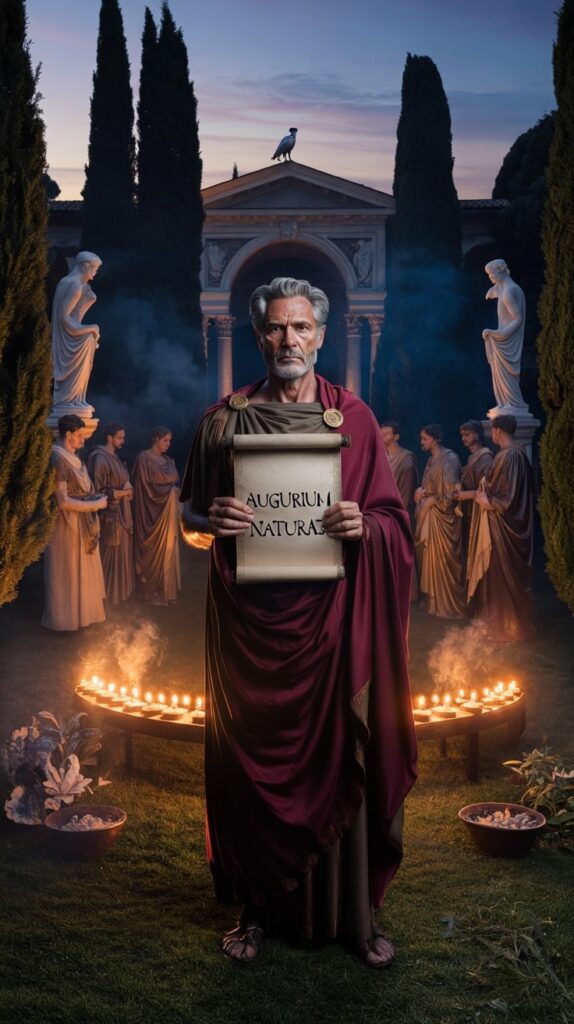
Philosophical And Medical Critiques Of Magic Amongst The Elite
The ancient Roman world wrestled with significant tensions between rational philosophy and superstition, especially when it came to magical practices embraced by the elite. Intellectuals often viewed magic as a threat to reasoned thought and social order. Magic was frequently linked to irrational fears and moral concerns, clashing with the ideals of self-control and wisdom promoted by philosophers.
Plato was among the most vocal critics. He warned that reliance on magic for personal gain or protection could erode one’s ethical foundation and distract from genuine virtue. According to Plato, magic tempted individuals to seek shortcuts in manipulating fate rather than cultivating moral character:
“Those who place their trust in spells and incantations risk losing sight of justice and truth.”
Physicians like Galen also expressed skepticism toward magical remedies, emphasizing empirical observation over superstition. While acknowledging some medicinal uses of herbs, Galen cautioned against excessive dependence on occult rituals or psychoactive substances, concerned about their potential physical harm and psychological instability.
Key points of critique included:
- The danger of moral decay resulting from an overreliance on supernatural interventions.
- The undermining of personal responsibility by attributing outcomes solely to magical forces.
- The conflict between philosophical rationalism—which prized knowledge through reason—and the unpredictable nature of magic.
These critiques illustrate a broader struggle within Roman society to reconcile emerging scientific thought with persistent mystical beliefs among the elite.
Coexistence With Orthodox Religious Observances In Ancient Rome
Ritual magic and orthodox religion in ancient Rome maintained a complex relationship, characterized by a notable religious duality. The Roman elite actively participated in public rites—official ceremonies endorsed by the state to honor gods like Jupiter, Mars, and Venus. These rites were communal, highly structured, and deeply embedded in societal norms.
At the same time, many elites engaged in covert rituals that operated outside the boundaries of sanctioned worship. These secretive magical practices were conducted in private settings such as secluded gardens, hidden chambers, or subterranean spaces. The purpose was often to invoke specific powers or secure personal advantages without attracting public scrutiny or risking accusations of impiety.
This dual engagement allowed the elite to navigate both traditional piety and personal spiritual ambitions:
- Public worship reinforced their social standing and loyalty to Rome’s religious institutions.
- Private occult rituals addressed individual needs for protection, influence, or fate manipulation.
The coexistence of these spheres reveals a pragmatic approach. The elite could publicly affirm their devotion through official ceremonies while privately exploring esoteric knowledge and power. This delicate balance highlighted the permeability between formal religion and personal mysticism in Roman culture.
Secretive magical rites did not necessarily contradict orthodox religion but rather complemented it by offering alternative avenues for control over unseen forces—a reflection of the layered spiritual landscape inhabited by Rome’s ruling class.
Conclusion
Ritual Magic and Occult Practices Amongst the Roman Elite Uncovered reveal much more than secret rites; they open a window into the complex cultural fabric of ancient Rome. These practices illustrate how power dynamics were deeply entwined with beliefs about fate and the supernatural. The elite’s use of magic was not mere superstition but a strategic tool to influence outcomes, assert dominance, and navigate the uncertainties of life.
The lasting impact of uncovering these occult aspects enriches our comprehension not only of Roman civilization but also of human nature itself, revealing an intrinsic desire to engage with the unknown.

